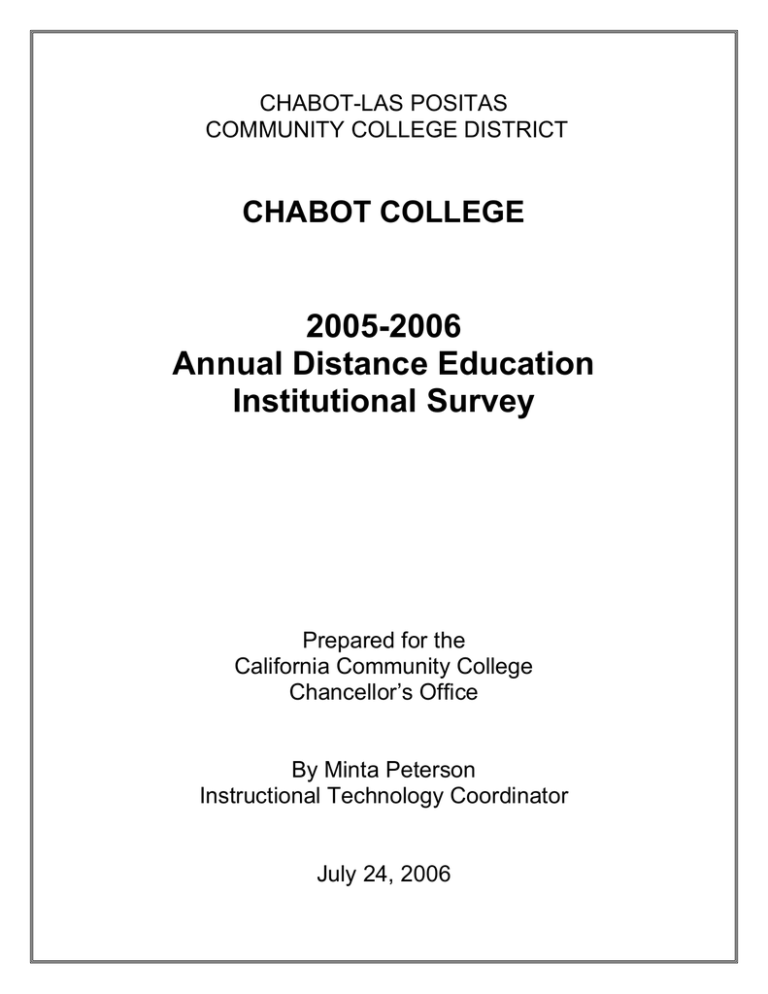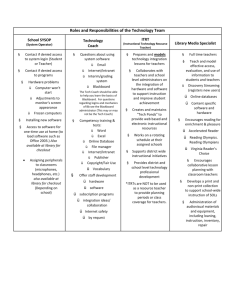2005-2006 Annual Distance Education Institutional Survey CHABOT COLLEGE
advertisement

CHABOT-LAS POSITAS COMMUNITY COLLEGE DISTRICT CHABOT COLLEGE 2005-2006 Annual Distance Education Institutional Survey Prepared for the California Community College Chancellor’s Office By Minta Peterson Instructional Technology Coordinator July 24, 2006 Narrative on 2005-2006 Chabot College Distance Education / Blackboard According to the California Community Colleges Distance Education Report from May 2005, DE course sessions have sustained an average annual growth rate of 23% for the past 9 years. For 20052006, Chabot College proved similar with a 24% increase in online courses since the previous year. Overall, the number of faculty interested in teaching DE courses, especially fully online courses, but also web-enhanced on-campus courses utilizing the course management system ‘Blackboard,’ continues to grow at a steady rate. In addition, to meet both the scheduling needs of students as well as address various learning styles, an increasing number of faculty are opting to develop courses with blended modes of delivery (referred to as “hybrids”), such as online courses with on-campus meetings. In the works for 2006-2007 course offerings include telecourse faculty developing hybrids to incorporate online learning as well as other interactive multimedia. Online Courses Course sections using Blackboard as a supplement Telecourses Summer 2005 Sections 17 Enrollment 755 All Sections 58 Total Enrollment 2,411 Non-DE sections 41 Faculty 33 Sections Enrollment 10 481 Fall 2005 41 1,399 237 6,881 196 98 Spring 2006 38 1,461 293 8,082 255 106 15 495 Annual Growth* 24% 9% 28% 16% 27% 23% 14 404 7% -3% *Semester-to-semester comparison (Fall 2004 to Fall 2005). With the continued steady growth and interest in the development of fully online courses, hybrids, as well as web-enhanced on-campus courses, two support groups have experienced a significant increase in request for services and support: • Distance Education Curriculum Support Committee (DECSC). • Training & technology services, as provided and by the Instructional Technology staff. Distance Education Curriculum Support Committee (DECSC) During the 2005-2006 year, 18 faculty submitted approximately 45 distance education proposals which were reviewed and approved by the DECSC committee. The delivery mode included 32 fully online, 12 hybrids, and 1 telecourse, most to be offered during the next academic year. More information, including the complete listing of courses approved, can be found at at www.chabotcollege.edu/DECSC/. In order to facilitate and streamline the proposal and review process, especially for faculty already experienced teaching DE, the committee approved a revised flowchart of the process. For faculty new to teaching DE, a real time presentation with the committee is required to review the course, offer suggestions, and to assist with any difficulties. For 2006-2007, the committee plans to advocate for a comprehensive plan to address the entire scope and future of DE courses, as well as continued attention on methodologies, pedagogies and technologies. Training & technology services Administrative and faculty support for Distance Education/Blackboard is primarily supported by two staff members within the Instructional Technology Center (ITC), which includes the Instructional Technology Coordinator Minta Peterson and Instructional Designer Lynn Sandoval. Support for students is provided in the Library by Computer Lab Supervisor Melita Fogle. More information about Blackboard assistance for faculty can be found at www.chabotcollege.edu/itc/Blackboard/. More information for Blackboard / Distance Education assistance for students can be found at www.chabotcollege.edu/DistanceEd/. Compared to last year, the Instructional Technology Coordinator received a 28% increase in demand for course sites (for both fully online and on-campus courses), while the Instructional Designer provided the corresponding training & instructional assistance for the growing number of requesting faculty (23%). Once past the initial introductory stage of site development, faculty (especially those teaching fully online courses) continue to utilize the one-on-one assistance provided by the Instructional Designer all throughout the year. The continued growth & interest in teaching online as well as for various related instructional technologies is reflected by the request for one-on-one workshops from Chabot College ITC staff, as well as through the @ONE Project. Lenora Pinkston from the @ONE Project reported that from summer 05 through spring 06, there were 22 Chabot participants registered for their institutes and distance education courses, seminars and broadcasts. In addition, there are currently 26 faculty/staff registered in @ONE’s self-paced course/video database, which started in December 2005. More details about the @ONE Project can be found at www.cccone.org/index.htm. It must be noted that in addition to support services for faculty with regard to Distance Education & Blackboard, the ITC also provides a much broader range of services. The ITC provides support services designed to enable faculty and staff to effectively use technology in the workplace and to support classroom instruction. The ITC provides workshops and individual consultation on supported software applications, Blackboard, as well as Web publishing. In addition to the Instructional Technology Coordinator and the Instructional Designer, the ITC also includes the Webmaster Joel Hagedorn and Instructional Assistant Arlene Adamson (who provides numerous workshops on a variety of software and manages the faculty/staff computer lab (the “Hub,” which is in the Library, room 121). More information about the ITC can be found at www.chabotcollege.edu/itc/. Attached is the annual DE survey which, pending Board approval, will be submitted online to the California Community Colleges Chancellor’s Office. Submitted by Minta Peterson MIS DETAIL Logon Page 1 of 7 California Home California Community College Chancellor's Office Fall/Spring 2005-2006 Annual Distance Education Institutional Survey 1. Does your campus offer distance education courses No Yes (if yes, please continue, if no please check the box and click on the submit button at the end of the survey.) 2. Do you target marketing/recruiting for distance education courses to any of the following groups?(Do not include schedule distribution; list only activities outside of the regular class schedule distribution.) No Yes, (Check all that apply): Asian, Pacific Islanders Black/African American Latino/Hispanic Disabled Students Nontraditional Students ESL Students Low Income Student Single Parents 3. How does your college train its distance education faculty? In developing and implementing distance education courses faculty use: (Check all that apply.) Faculty's own initiative (seminar, course, etc.) Flex session on how to develop distance ed. courses Funded Education Distance ed. course development manual Faculty release time to learn skills for development of distance education courses. Faculty trained at California Virtual Campus (CVC) regional centers? How many? Faculty trained by the @One Training Program. How many? 22 Faculty are provided training to ensure accesss for the disabled? Other (specify): Campus trainer on Blackboard & course development. We do not have a faculty training program. 4. Has your college collaborated with other colleges to develop, teach, or deliver http://misweb.cccco.edu/esed/disted/DESurvey_inst_0506.cfm?collcode=482&CFID=116... 7/24/2006 MIS DETAIL Logon Page 2 of 7 distance education courses? Yes (If yes, name partner college(s) and in what ways you collaborated.) (Check all that apply) No Partner College(s): Share Blackboard server with Las Positas College Course Material Shared Delivery Technology Faculty Training Curriculum Development Course Development Shared Equipment/Facility Shared Faculty CVC Regional participant 5. Is your college aware of the distance education resources available through the CVC Regional centers at Butte College and @One at Evergreen College? No, We are not aware of the CVU/CVC Regional Centers services. Yes, If yes, in which of the following CVU/CVC-sponsored activities did your college participate? (Check all that apply) Training Course Hosting On-line resources Consultation Technical support Student Services 6. How do distance education students communicate with their instructors at your college? (Check all that apply.) Regular Mail (Postal Services) E-mail Voice Mail FAX Telephone during Class Face-to-face on Campus Internet Video Conference Telephone (Personal Calls) No Contact Other (specify): 7. How important are the following with regard to developing, teaching and delivering distance education courses at your college? Rate each issue on a scale from 1 (least important) to 5 (most important). Faculty compensation 4 Faculty training 4 http://misweb.cccco.edu/esed/disted/DESurvey_inst_0506.cfm?collcode=482&CFID=116... 7/24/2006 MIS DETAIL Logon Page 3 of 7 Teaching load 5 Student learning 5 Articulation/Transfer 4 Regular personal contact between student and faculty 5 State apportionment formula 4 Institutional fund/resources distribution 5 Equipment/facility 4 Scheduling 5 Class size 5 Copy right/intellectual property right 3 Curriculum development/approval 5 Technical support 5 Library Consultation 5 Access to Library and Learning Resource Programs 5 CVU/CVC Help desk 1 Other (specify): 8. What access do the students taking distance education courses have to the following services and facilities? (Check all that apply) Walkin Kiosks Dial Telephone Internet Portal Library: A) Information Resources Library: B) Instruction/Reference Assistance Writing Lab Transfer Center Counseling EOPS http://misweb.cccco.edu/esed/disted/DESurvey_inst_0506.cfm?collcode=482&CFID=116... 7/24/2006 MIS DETAIL Logon Page 4 of 7 Financial Aid Tutoring and Learning Assistance Orientation Career Service Job Placement Science Laboratories DSPS Admission Course Registration 9. What is the faculty selection process for distance education courses at your college? Parallels that for campus-based courses. Differs from campus-basesd courses. Is not formalized. 10. Do you do a cost/benefit analysis when deciding whether to develop distance education courses? Formal Analysis Informal Analysis No Analysis Developed 11. How do start up costs for distance education compare with traditional modes of instruction? (Check all that apply) (Please pull down menu to chose response) Equipment replacement/upgrade Higher Technology support Higher Faculty development About the Same Faculty salary/benefit About the Same Instruction supply About the Same Curriculum course development About the Same Course production Lower Library and Learning Resources Programs About the Same 12. How do continuing costs for distance education compare with traditional modes of instruction? http://misweb.cccco.edu/esed/disted/DESurvey_inst_0506.cfm?collcode=482&CFID=116... 7/24/2006 MIS DETAIL Logon Page 5 of 7 (Check all that apply) (Please pull down menu to chose response) Equipment replacement/upgrade Higher Technology support Higher Faculty development About the Same Faculty salary/benefit About the Same Instruction supply About the Same Curriculum course development About the Same Course production Lower Library and Learning Resources Programs About the Same 13. If your college expanded your distance education program or added new delivery methods in 2005-2006, please indicate: (Type in response) The nature of the expansion: 24% increase in online courses. The new method of delivery What are the estimated additional costs associated with the expansion or new delivery method? None. 14. In 2005-2006 did your college offer a degree or certificate program in distance education? No, we did not offer a degree or certificate program entirely via distance education. Yes (If yes-complete the following question and estimates for each program or certificate started)(Type in response) z z z Identify subject matter area for degree program Identify subject matter area for certificate Please estimate what is the implementation cost of your distance education program at your college for 2005-2006 academic year? (Please pull down menu to chose response) Equipment replacement/upgrade $0-$10,000 Technology support $0-$10,000 Faculty development $0-$10,000 Instruction supply $0-$10,000 http://misweb.cccco.edu/esed/disted/DESurvey_inst_0506.cfm?collcode=482&CFID=116... 7/24/2006 MIS DETAIL Logon Page 6 of 7 Curriculum course development $0-$10,000 On-line course conversion $0-$10,000 Course production $0-$10,000 Library and Learning Resource Programs $0-$10,000 z z z Identify subject matter area for degree program Identify subject matter area for certificate Please estimate what is the implementation cost of your distance education program at your college for 2005-2006 academic year? (Please pull down menu to chose response) Equipment replacement/upgrade $0-$10,000 Technology support $0-$10,000 Faculty development $0-$10,000 Instruction supply $0-$10,000 Curriculum course development $0-$10,000 On-line course conversion $0-$10,000 Course production $0-$10,000 Library and Learning Resource Programs $0-$10,000 z z z Identify subject matter area for degree program Identify subject matter area for certificate Please estimate what is the implementation cost of your distance education program at your college for 2005-2006 academic year? (Please pull down menu to chose response) Equipment replacement/upgrade $0-$10,000 Technology support $0-$10,000 Faculty development $0-$10,000 Instruction supply $0-$10,000 Curriculum course development $0-$10,000 On-line course conversion $0-$10,000 Course production $0-$10,000 Library and Learning Resource Programs $0-$10,000 http://misweb.cccco.edu/esed/disted/DESurvey_inst_0506.cfm?collcode=482&CFID=116... 7/24/2006 MIS DETAIL Logon Page 7 of 7 Submit Information http://misweb.cccco.edu/esed/disted/DESurvey_inst_0506.cfm?collcode=482&CFID=116... 7/24/2006
